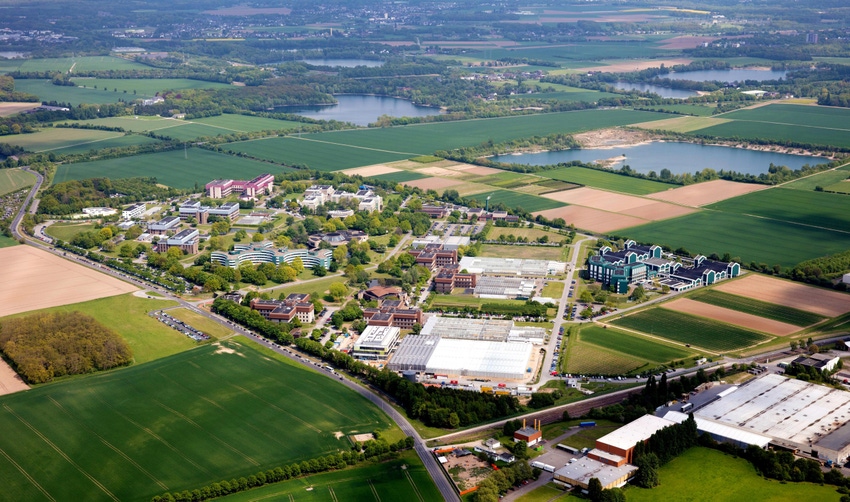Bayer investing in new R&D facility at its Monheim site
Largest single investment in Crop Protection in Germany for 40 years.
August 31, 2023

Bayer significantly strengthens its commitment to innovation in regenerative agriculture with a EUR 220 million (approximately $239 million) investment in research and development (R&D) at its Monheim site. This is the company’s largest single investment in its Crop Protection business in Germany since the founding of the Monheim campus in 1979. The new Product Safety complex with labs, offices, and a greenhouse area offers space for approximately 200 employees. Its principal focus will be on developing the next generation of chemicals for a sustainable future and enhancing the environmental and human safety of Crop Protection. The new facility will boost Bayer’s efforts to become a major contributor to regenerative agriculture by developing and bringing to market new Crop Protection solutions which have even better environmental profiles than those currently available and will play a key role in significantly reducing agriculture’s impact on the environment.
"Looking into the future, we must radically transform today’s farming systems and switch to regenerative agriculture practices that produce more with less, while restoring more. There is a high demand for pushing beyond established standards in safety to unlock breakthrough innovation and Crop Protection solutions with better environmental profiles," said Dr. Robert Reiter, head of R&D at Bayer’s Crop Science Division. "The livelihoods of farmers and the communities they serve around the world are in no small measure dependent on the acceptance of our products by consumers, lawmakers, and regulators around the world. We are convinced that with this significant investment we are not only helping to accelerate the development of the next generation of Crop Protection but also underscoring our deep commitment to transparency and dialog."
The investment is also a clear commitment to Europe as a base of operations as well as one important cornerstone of Bayer’s Future Concept for Germany. "Even in times of economic uncertainty, we are laser-focused on innovation and future technologies," Dirk Backhaus, head of Product Supply at Crop Science, pointed out. "We have a long track record of investing into research, development, and production of safe chemical products for agriculture, and we’re eager to leverage our world class expertise in Germany to shape the future of regenerative agriculture here and around the world. The new facility at our Monheim site is a shining example of precisely that: Investments in future technologies, modern facilities, and, most importantly, our people."
Over the past three years, Bayer has invested EUR 180 million (approximately $195 million) at its Dormagen site, with a focus on expanding production capacities for modern Crop Protection.
Science-based innovation is key to a sustainable and highly productive agriculture system that is able to feed an ever-increasing world population. Crop Protection safeguards around 30% of yields worldwide. That’s the equivalent of food for more than 2 billion people and limits further land use change from natural habitats. The opportunity to invent better, climate neutral and environmentally benign Crop Protection products is huge and aims to strengthen Bayer’s global competitiveness. As such, this investment also reflects Bayer's commitment to the innovative capacity of Germany and Europe. The anticipated construction period of the new Monheim facility will be around 3 years. Full commissioning is planned for 2026.
Environmental protection transforms established safety assessments
In Europe as well as in other regions, strict policy and regulatory frameworks ensure that plant protection products are safe, when used in accordance with the label instructions, and that they have no unacceptable effects on the environment. "To support the safety of our products, we address all concerns of regulators using high-quality metabolism, human and environmental data packages for thorough risk assessments," Dr. Axel Trautwein, head of Regulatory Science at Crop Science, pointed out. "The new building will allow tests and studies to be conducted according to regulatory standards and under more realistic conditions similar to those in nature."
In addition to residue analytics and metabolism studies in target crops, rotational crops and livestock for human safety, the key focus area will be on environmental safety. This includes exposure studies in different environmental compartments as well as safety studies on non-target organisms such as aquatic and soil organisms, wild birds and mammals, and pollinators like honey bees and bumble bees to generate a holistic understanding of environmental exposure and effects of Crop Protection products. In addition, the flexible lab design enables future adjustments to the dynamic global regulatory landscape.
Artificial Intelligence helps Bayer design the next generation of Crop Protection
The new R&D facilities will be an important cornerstone of Bayer’s new innovation approach for Crop Protection. Already today, Bayer’s product portfolio ranks very well in terms of environmental impact. But the company is strongly committed to reducing it even further and pushing beyond established standards.
"With our new disruptive innovation approach – what we call CropKey – we are now designing molecules instead of selecting them," said Rachel Rama, head of Small Molecules at Crop Science. "This is based on a discovery concept which allows us to create solutions based on the predefined safety and sustainability profiles that go above and beyond current standards."
Data science, early safety screenings, modeling and artificial intelligence are crucial elements that enable our top scientists to create the next generation of Crop Protection, taking advantage of massive amounts of data and machine learning and setting a new benchmark.
"With our investment in Monheim, we are now building a new data powerhouse in a high-tech work environment that will be highly attractive for our researchers and future top talents," Rama added.
The new innovation approach to Crop Protection is also clearly aligned with Bayer’s sustainability commitment to reduce the environmental impact of Crop Protection products by 30% by 2030.
You May Also Like



